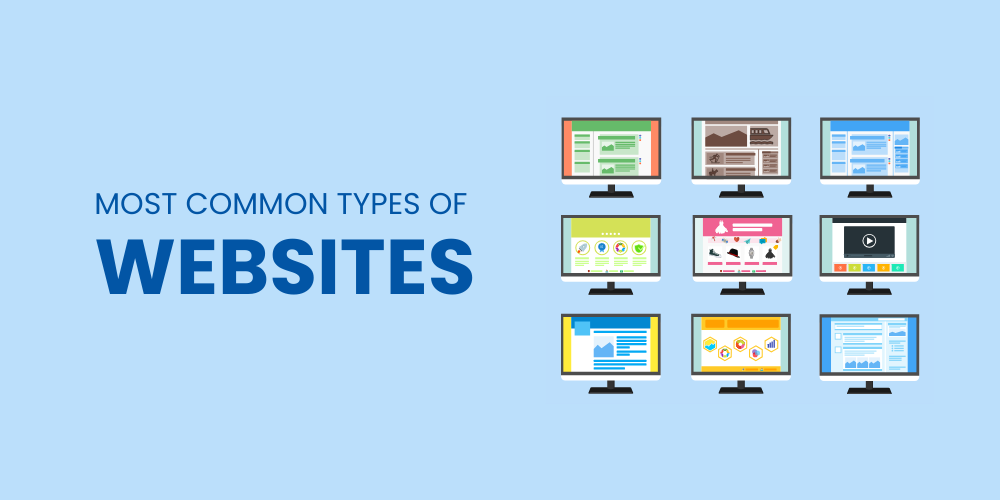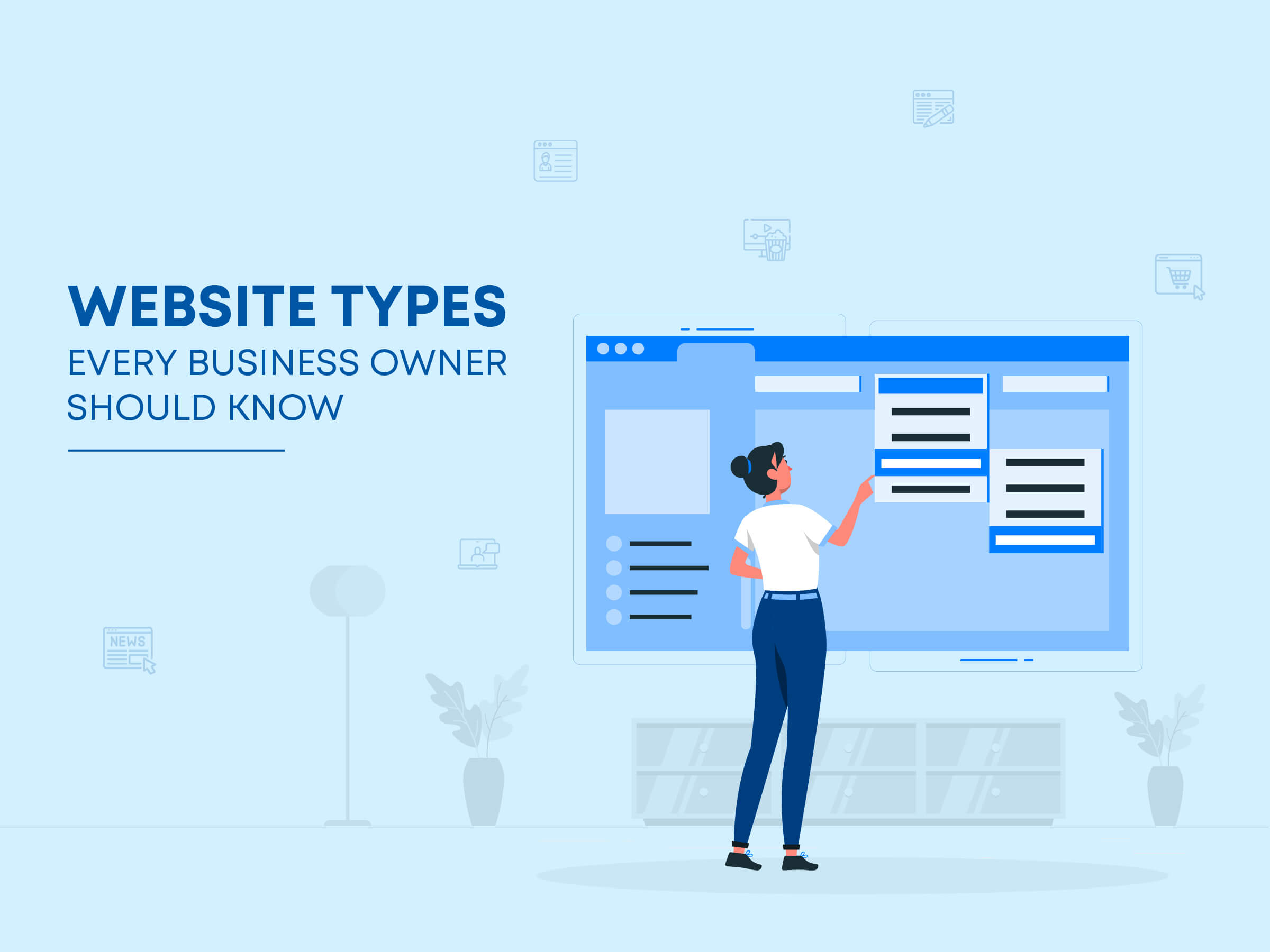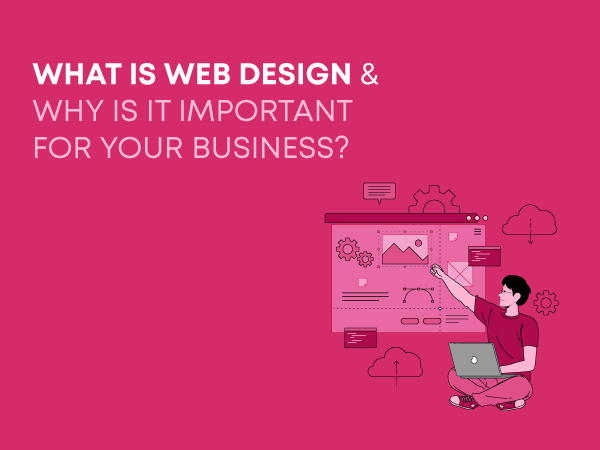In today’s rapidly advancing digital world, businesses without a website are no longer part of the race! Astonishingly, a Zippia report highlights that over 25% of businesses still lack an online presence!
A website, however, is an indispensable asset for businesses of all sizes. It goes beyond being a brand’s digital face; it serves as a dynamic platform to connect with customers, showcase products or services, and cultivate meaningful relationships that drive success.
With the different types of websites available, business owners must identify the ones best aligned with their objectives. Each website type in this list offers unique features and functionalities, empowering businesses to excel in sales and marketing education and boosting online visibility. Collaborating with a reputable web development company in India can be crucial for companies seeking to establish their digital presence.
In this article, we’ll explore the 16 essential types of websites that every business owner should know about, including both static websites and dynamic websites.
So, without any further delay, let’s dive straight in!
List of Different Types of Websites
eCommerce Websites
eCommerce websites are rapidly gaining traction, fueling a staggering $5.8 trillion industry projected to soar to $8 trillion by 2027!
These dynamic websites are purpose-built for selling products or services online and equipped with essential features like shopping carts, payment gateways, product catalogs, and inventory management systems.
However, there is one thing that sets eCommerce websites apart: their ability to eliminate geographical boundaries, enabling businesses to tap into a global market. Their only primary objective is to drive sales.
Some examples of eCommerce include Amazon and Flipkart, which exemplify the power of eCommerce, offering customers seamless shopping experiences through intuitive navigation, detailed product descriptions, and secure payment options.
Blogging Websites
Next on the list are blogging sites, once casual platforms for personal interests that have evolved into powerful business tools. Entrepreneurs today use blogs to establish an online presence, publish topic-focused articles, and drive growth.
As a business owner, you can build a blogging site because a well-crafted blog can boost your website traffic, build authority, convert leads, and nurture them into customers. Also, a niche-relevant blog showcases expertise and commitment, positioning your brand as a leader in its industry.
Some examples of well-known blogging sites include Hubspot and WordPress.
Corporate Website
Next are corporate websites, which act as the digital face of your company. Designed to deliver comprehensive insights, corporate websites typically showcase the company’s profile, product offerings, project portfolios, and contact details. They often feature news or blogs to update audiences on the latest business activities.
Notable examples like Microsoft and Apple demonstrate how corporate websites go beyond brand representation, offering valuable, targeted information to engage and inform their audience effectively.
News Website
Unlike entertainment platforms, news websites focus primarily on delivering information rather than amusement. Their design typically leans toward a clean and structured aesthetic, distinct from the dynamic layouts of entertainment sites.
For instance, The Hindustan Times employs a grid-based design to showcase the latest stories while utilizing typography that mimics the look and feel of its printed edition.
Personal Website
A personal website is a powerful tool for elevating your online presence and showcasing your passion. It offers a dedicated space to highlight your craft, express your personality, and share your interests with the world.
Whether you aim to gain recognition for your talents or simply want a platform to reflect who you are, a personal website is the perfect solution to achieve it all.
Educational Website
Educational websites serve as platforms for schools and institutions to share information about their offerings and provide valuable resources for students. These sites often host study materials and, in many cases, offer online courses, enabling students to explore subjects beyond the confines of traditional classrooms.
Prominent examples include Coursera, Udemy, and Khan Academy, which grant access to many learning opportunities, from foundational courses to advanced professional certifications.
Informational Website
Informational websites are essential for individuals seeking detailed insights on specific topics, products, or services. Designed to provide comprehensive and enduring content, these platforms effectively answer readers’ most pressing questions.
Such websites also position individuals or organizations as authorities through effective knowledge sharing and mass communication. A prime example of an informational website is Wikipedia, which is best known for its vast knowledge repository.
Entertainment Website
An entertainment website is designed to deliver engaging content that captivates its audience. These platforms often feature news, videos, movies, and more, focusing on high-quality media like music, images, and films.
Some popular examples include YouTube and Netflix for streaming, while sites like Pinkvilla cater to a Bollywood-focused audience. These sites excel in creating innovative and immersive entertainment experiences.
Startup Website
Some experiences are as exhilarating as launching your own business. A well-crafted startup website is a dynamic platform to share that enthusiasm and showcase your groundbreaking ideas to the world.
Startup websites often feature landing pages, product demos, and reviews and may initially include crowdfunding pages or other funding resources. In the end, the primary goal of your startup website is to captivate customers and attract potential investors.
Linktree is a prime example of a startup website.
Booking Website
Few experiences are as exciting as planning your next adventure. A well-designed booking website is your gateway to seamless travel, helping you explore the world easily and conveniently.
These websites often feature user-friendly search options, real-time availability, and personalized recommendations, ensuring an effortless planning experience. A booking website aims to connect travellers with their dream destinations while delivering unparalleled convenience and satisfaction.
Booking.com and AirBnb are some popular examples of booking websites.
Coupon Website
Want to offer unbreakable deals to your users? Creating a coupon website is the perfect solution. These platforms are designed to help users discover exclusive coupons and discounts, significantly reducing their expenses.
A coupon website is a centralized hub, aggregating and sharing promotional codes, special offers, and deals from various retailers and service providers, making saving effortlessly accessible.
CouponDunia and CashKaro are two popular coupon websites.
Job Board Website
Job boards or job websites are the ultimate destinations for discovering your ideal career opportunities. Far more convenient than the traditional method of distributing resumes door-to-door, these platforms seamlessly connect job seekers with employers, showcasing a wide range of available roles.
Indeed and Monster.com are two famous platforms for job board websites.
Portfolio Website
A portfolio website is ideal for creative professionals such as authors, designers, artists, and freelancers to showcase their talents and achievements.
It highlights skills, expertise, projects, and collaborations, making it a personalized platform to attract potential clients. Unlike business websites, portfolio sites are uniquely tailored, whether for art, music, literature, or sports, offering a dynamic way to express your passion and professionalism.
Behance and Dribble are two perfect examples of portfolio websites.
Travel Website
A travel website is your ultimate guide to planning the perfect getaway. It offers valuable insights into a destination's top attractions, accommodations, and unique experiences. With stunning photography and fascinating videos, these sites inspire visitors to turn their dream trips into reality and book their next adventure.
Tripadvisor and Expedia are some well-known examples of travel websites.
Nonprofit/Organization Website
A nonprofit website provides a seamless platform for potential donors to learn about your organization and make informed decisions about their contributions.
Creating a website for your nonprofit is crucial in establishing credibility and expanding your reach, especially if you are going to start an NGO. It is a powerful tool to solicit donations, engage supporters, and drive the success of the projects you manage.
WWF or World Wildlife Fund and PETA are two popular examples of nonprofit/organization websites.
Directory Website
A directory website is like an upgraded version of an informational site, offering users detailed and well-organized lists of resources focused on a specific topic or industry. Whether it’s real estate listing or job directories, these sites provide a wealth of information. Multiple categories and integrated search functions enable visitors to find what they’re looking for quickly.
Yelp and Yellow Pages are the two most popular examples of directory websites.
Which are the Most Common Types of Websites?

So, these are some websites that every business owner should know. However, if you want to know which are the most common types of websites that are being popular, then that includes:
eCommerce websites
Portfolio websites
Personal websites
Blogging sites and
Entertainment sites
What to Consider While Choosing the Right Website Type
Choosing the right type of website is crucial for achieving your business goals. However, while choosing one, you should consider factors like your target audience, the purpose of your website, and the features you need to engage visitors effectively.
Whether building an eCommerce platform or a personal blog, aligning your website type with your objectives ensures maximum impact. In short, focus on user experience, functionality, and scalability to create a site that looks great and delivers results.
Conclusion
In conclusion, understanding these different types of websites are available for any business owner looking to make an impactful online presence. Whether you are building a site to showcase your brand, connect with customers, or drive sales, choosing the right type can significantly influence your success.
By aligning your website with your business goals and audience needs, you can create a powerful tool that elevates your brand, fosters customer relationships, and drives growth. The right website type is more than just a digital space; it’s an investment in the future of your business.


